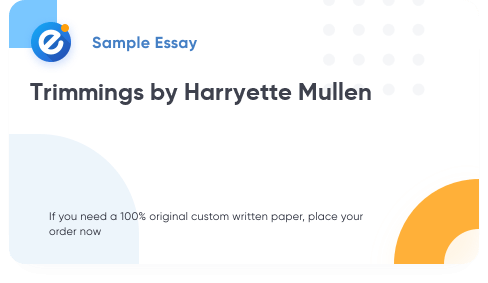
Trimmings is a collection of short experimental poems, where the author tried to discover different social problems, including race and women’s rights. Harryette Mullen used the unusual structure to convert a paranoiac and stressful state of society which is intolerant to its classes, especially to women. In this case, she decided to describe all clothing and accessories that a person could wear, repeating the same operation from one poem to another. It reminds the endless series of similar everyday transactions that describe an average woman stereotypically. The aim of the current essay is to analyze how Mullen deconstructed and generalized the female narrative due to the list of free associations about women’s garments and accessories.
The structure of the poetry is unusual because the author created the diary of imaginary characters. It is not a classical poem in one column, but rather a collection of different drawings or letters that the reader should collect by himself/herself. It seems that Mullen wrote the poetry spontaneously, developing the situation for conscious and unconscious associations about women, which are shattered and fragmented in the society. Therefore, every page has one or more lines, depending on the goal. For example, the poetess generates an impression of everyday affairs and worries in one associative sentence “Garters garnish daughters partner what mothers they gather they tether” (Mullen 13). One more important feature of the structure is that the author lists women’s garments “Decorative scrap. A rib, on loan. Fine fabric, finished at edges” (Mullen 30). However, it is not just a collection of different materials of everyday life, but preferably the hidden women’s history or even the list of their experiences from certain periods of life. Mullen wants to convince that female anxiety appears in the common everyday things.
Calculate the cost of essay
The author published this poetry in the early nineties when feminism and racial issues were particularly relevant. Therefore, Mullen tried to reflect the social shifts regarding the status of women, especially in the context of such marginal topics as a black woman. Nevertheless, there one can find humor and irony in Trimmings that connects with the paradigm of postmodernism. In this sense, it was important to deconstruct traditional rules of poetry. Hence, there are many experiments with form, rhythm, style, and content. Moreover, the author experienced to use “not only rational, but also irrational, unconscious, and intuitive language” (Henning), revealing the hidden layers of a woman’s history. The combination of different themes from the poetess’s backgrounds singled out this collection out of the most representative at that time.
The entire collection evoked deep feelings and associations about all women because it has many rare images, symbols, and comparisons. I was particularly impressed how Mullen used the pattern of repetition “Frilled up to here, she starts sleeking. Flat, flatter, flatterer” (52). All this counting of things reminds a shamanistic ritual, and thus the poetry has created a hypnotic effect. In fact, the author did not design it for rational perception, because the usual rules of logic do not work here. For a deeper understanding, it is important to feel and to trust the rhythm and even to finish the line. Accordingly, Mullen left so much space on the page for the reader to continue the story in the future.
Limited Time
special offer
To sum it up, one can see that the unique style and structure of Mullen’s poems differ her from other poets. Undoubtedly, the poetry stands out on the cultural background in the nineties. She tried to reconsider the stereotypes about women in the context of the destruction of patriarchal society. In this case, the author collected and listed clothing, associations, experiments, and images to simulate a situation in which a woman could overcome her traumatic experience.

